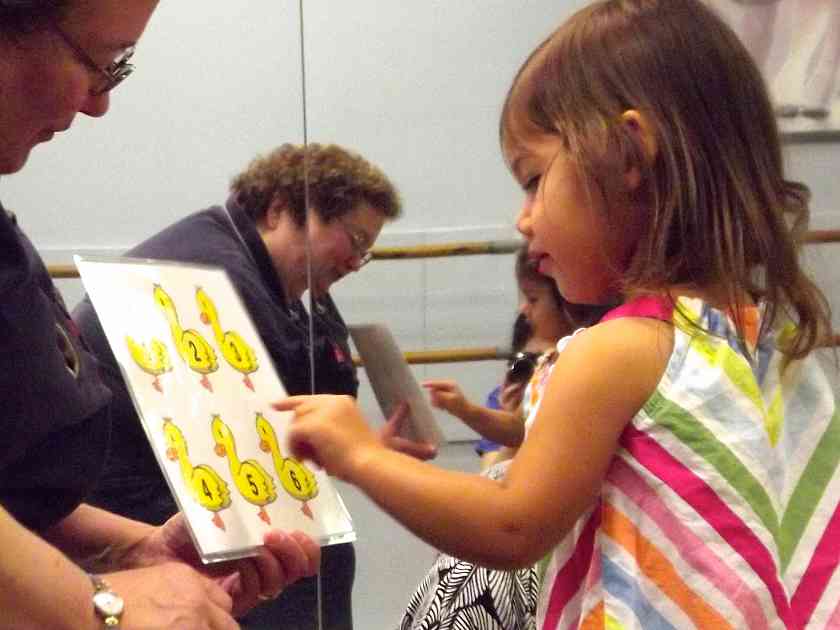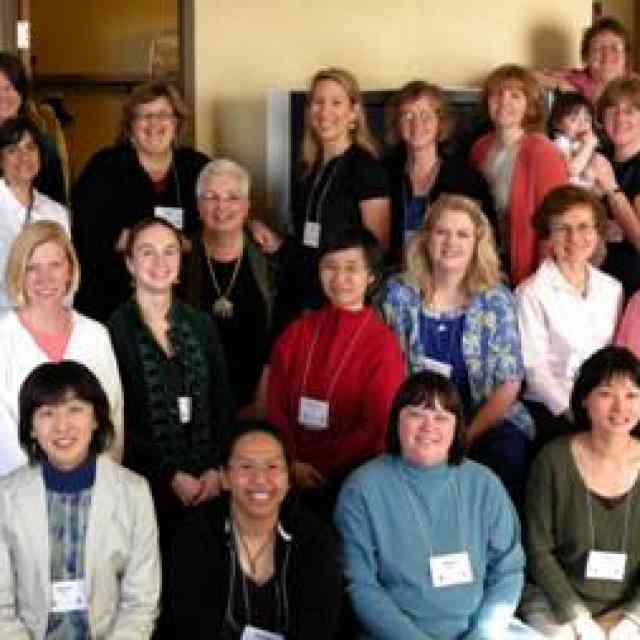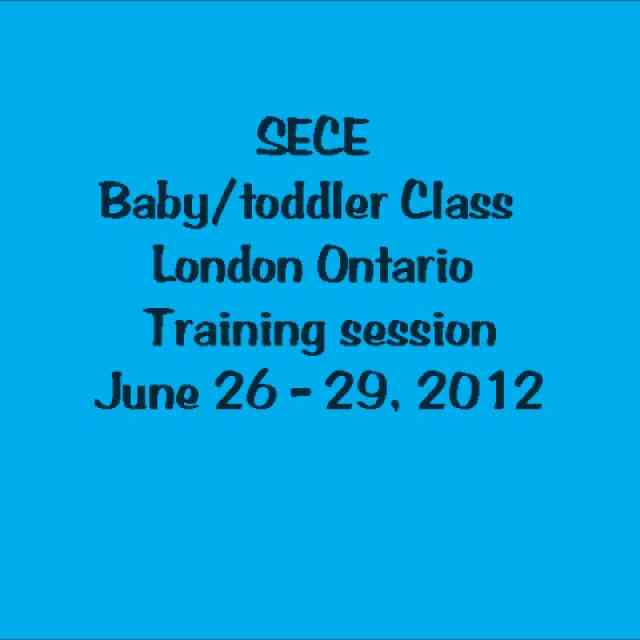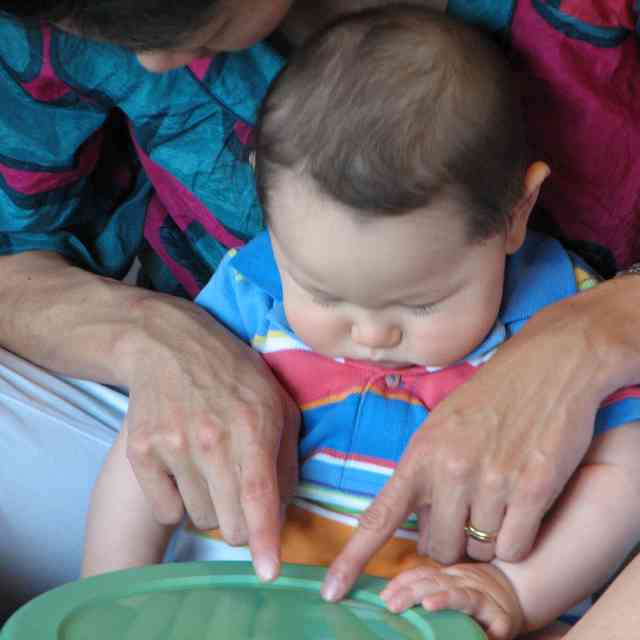
Danette Schuh and SECE Student
The hallway conversations between parents before and after class always intrigue me. Often, after class has ended and the teachers are writing their comments in the students’ baby class journals, bits of the conversations float into the room. “Is she sleeping through the night yet?” “She will talk, but only one-syllable words right now.” “He started walking at fourteen months.” The time at which they progress through the stages of development is so important and they are quick to compare. There is always that underlying anxiety—“Is my child progressing at the ‘right’ time and the ‘right’ speed?”
When I speak to the parents in baby class (each of my Suzuki Early Childhood classes has a mini parent education “minute” near the end), the “right” timing is discussed. We often read The Carrot Seed, a baby board book about a little boy who plants a seed, nurtures it, and continues to have faith that it will grow, even as others voice their doubts. I will speak about how Suzuki often used plants as a metaphor for children. You wouldn’t pull on the head of a little flower, trying to get it to grow faster, he might say, you would only destroy it. I explain, as the book says, we just need to pull up the weeds around the seed and sprinkle the ground with water. Prepare the environment, be patient, persevere, and allow the child to grow—all in their own time, never on our schedule.
In the ECE class, it seems so natural, so simple, and yet so profound. At first, the baby in mother’s arms just watches and listens. In the very beginning (we have had babies in class as young as seven weeks), the changes are small. It may be that the baby stays awake a little longer each week, interested in hearing the music and watching the other children. The awareness of the environment grows gradually. As they get older, they will reach out for the mallet that the teacher offers, signaling that they feel ready to let the teacher guide them in playing the brightly colored lollipop drum. Once the babies have begun to walk, you can’t miss the excitement on their faces the first time they can stand and hold hands in the circle, or walk up to the teacher by themselves for their first turn counting the ducks in the picture before we sing about the Six Little Ducks. The memory of those beaming faces can still light up my whole day! I marvel every time at the exclamations of all the parents in the room when an almost-three-year-old plays the Mississippi Stop Stop rhythm on the lollipop drum for the first time, all by themselves, to signal the group to change direction while marching in the circle. No one forced their hand or pushed them before they were ready. Each new step was modeled by the older children in the class as well as by the teachers and parents so that every child progresses with joyful anticipation. On the days that the mallet is refused or the ducks not counted, there is no admonishment from the parents or the teachers. A simple nod and the words “next time” are all that is needed. It is understood that learning happens in their own time, and not on our schedule. In the life of a child, there are periods of regression before a major stage of mental, emotional or physical development. Some doctors refer to this as the “wonder weeks.” We see this often in ECE class. Skills seem to be forgotten and favorite activities are ignored, but if we can just be patient for a few weeks, the child will always surprise us with a big leap in learning.
The individual stories are many. One two-year old girl—I’ll call her Alice—had been in class for over a year. She would happily come up to the teacher for turns on the xylophone and glockenspiel, count the ducks, play the lollipop drum independently, and more. One day, to everyone’s surprise, Alice shook her head and replied “no” to every offer of a mallet or of a turn. It was fascinating to watch her behavior. When it was time to play the xylophone, she would sit very close to the teacher during everyone’s turn, watching intently with laser focus. After a few classes, she was ready to play the instrument on her own, without guidance from the teacher! Alice knew when she was ready and was saving all her attention and energy to develop that new skill. Another toddler, Jimmy, was very shy and stayed next to Mommy, refusing the mallet, declining every turn, for almost two years. We just nodded and said, “next time,” with no concern. You could feel the excitement from the entire class on the day when Jimmy had his moment of readiness and did every activity, played every instrument, sang every song and happily ran up to the teacher for every turn! Through observation, the learning was happening, but the participation needed to happen in his own time. Two years is a long time for us to be patient and persevere, but the rewards are immense.
Experiencing the process is powerful. The parents come to class bursting with stories of what happened when they turned on the CD at home. “She kept the beat on her knees!” “He sang Rain Rain in the car!” One mother shared a wonderful story of how her three-year-old daughter assembled her dolls and baby sister in a circle to “teach” her own ECE class at home! This is the Mother Tongue Method. Prepare the environment, encourage and persevere, not hurrying, not resting, and the child will happily show you the results at their own moment of readiness.
Each week, I hope the parents continue to look at their children in a new light. Maybe they will not concern themselves with the numbers, but in supporting and nurturing the overall development of their child. Maybe they will pay closer attention to preparing the environment, encouraging and persevering, and allowing their children to show them when they are ready, all in their own time.










Comments
24 posts
Thanks for a great SECE article Danette. I certainly agree that the smiles and excitement of learning in these classes is truly rewarding for the teachers!
Institute Director
Houston, TX
11 posts
Thank you, Dorothy! Yes, we always feel lucky to be able to share these incredible moments with the parents of all these children.